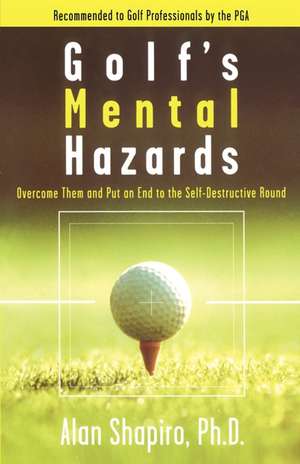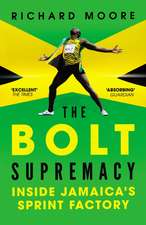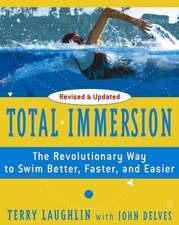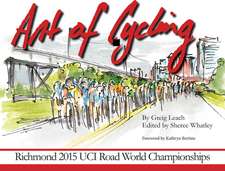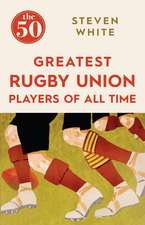Golf's Mental Hazards: Overcome Them and Put an End to the Self-Destructive Round
Autor Alan Shapiroen Limba Engleză Paperback – 7 ian 1997
According to Dr. Alan Shapiro, the personality traits that cause problems in your everyday life can also wreak havoc on your golf game. If you're a worrier, chances are you're also anxious at the tee. If you're a control freak, you probably overanalyze your swing and tend to freeze up over the ball. If you have a short fuse, there is a good chance you're a club thrower.
Using his experience as a psychologist and a devoted golfer, Dr. Shapiro has identified six major golf personality types or "Mental Hazards." Just take the simple, forty-eight-question quiz provided to determine your Mental Hazard Profile, then read and apply Dr. Shapiro's customized advice for overcoming the Mental Hazards that plague you on and off the course.
No matter what your handicap, the unique approach of Golf's Mental Hazards will lead to increased self-awareness and lower golf scores, finally putting an end to the self-destructive round.
Preț: 94.30 lei
Nou
Puncte Express: 141
Preț estimativ în valută:
18.05€ • 18.77$ • 14.90£
18.05€ • 18.77$ • 14.90£
Carte disponibilă
Livrare economică 24 martie-07 aprilie
Preluare comenzi: 021 569.72.76
Specificații
ISBN-13: 9780684804576
ISBN-10: 0684804573
Pagini: 224
Ilustrații: 2 CHARTS
Dimensiuni: 140 x 216 x 20 mm
Greutate: 0.3 kg
Ediția:Original
Editura: Touchstone Publishing
Colecția Touchstone
ISBN-10: 0684804573
Pagini: 224
Ilustrații: 2 CHARTS
Dimensiuni: 140 x 216 x 20 mm
Greutate: 0.3 kg
Ediția:Original
Editura: Touchstone Publishing
Colecția Touchstone
Notă biografică
Alan Shapiro, Ph.D., is a psychologist in private practice and founder of Mental Skills Development, an organization that offers workshops for amateur and professional golfers. He was elected to serve on the subscribers' board of Golf Illustrated and lives with his wife and three children in Albany, New York.
Extras
Chapter 1
A Matter of Life and Death?
"Like life, golf can be humbling. However, little good comes from brooding about mistakes we've made. The next shot, in golf or in life, is the big one."
Grantland Rice
I recall a conversation with a middle-aged acquaintance who loved to participate in sports but found that his basketball and softball days were pretty much finished. All of my attempts at selling him on golf were futile. "Too boring" or "It's not a real sport" was his objection. I kept pushing until the truth finally came out. "I'm not going to get into golf until I can really get into it. Probably not until I retire. You golfers are crazy. It's all you eat, sleep, and breathe. Golf's not a game. It's insanity. No, golf's not a game. Golf's...golf's...life!"
This reluctant golfer was onto something. As obsessions, compulsions, addictions, and all fanatical pursuits go, golf is probably one of the more harmless of life-altering activities. But still, golf has a special power over its followers. And not unlike most powerful influences, it can have a negative impact or it can yield positive, life-enhancing outcomes.
Are You Your Golf Game?
In the next chapter, you will have the opportunity to self-administer the Mental Hazard Assessment Scale (MHAS). But before you take this test and consider the information that it will provide, take an honest look at yourself. What kind of person are you? Are you a nervous, worrier type? Does your temper get the best of you sometimes? Do your moods affect the people around you? Do you worry about the way other people see you? Do you try to control the lives of others? Do you see yourself as a lazy, chronic underachiever?
Next, consider whether these attributes are evident in your golf game. Do you enjoy your time on the golf course, find it relaxing and peaceful? If you answered affirmatively, golf is clearly playing a positive role in your life. On the other hand, if your response was more along the lines of maybe, sometimes, or it depends, the answer is less clear, and some honest self-examination is probably in order.
Nobody is perfect. Everyone has, to some extent, some form of a dark side that acts out in anger, fear, or jealousy. And because golf is played with the same whole body and mind that lives the rest of your life, these qualities, to some extent, will carry over to your golf game. It is important, however, to be aware that this has both positive and negative implications. On the plus side, while you are eliminating hazardous, self-destructive tendencies on the golf course, you can work on qualities of temperament that impede your everyday life. You can become a better golfer and a better person as part of the same process.
Conversely, due to the impossible nature of the game, your golf performance will oftentimes be disappointing, setting you up for frustration and despair. Keep in mind, and remind yourself again and again, that hitting a green or sinking a birdie putt is not the sole determinant of your self-worth. It will not be what determines whether or not your kids go to college. And even if it did, your life would still encompass a broader base than that which is measured by golf performance. This is true even for golfers who depend on golf success for their livelihood. Successful pros are quick to rank their game in order of importance behind a relationship with God and their families. They recognize that even though their livelihood is dependent on golf per formance, it is still not a matter of life and death.
Do You Cheat?
I recall standing in front of an audience of golf school enrollees and proclaiming that "I have cheated at golf." The audience remained silent while I paused before adding that "Of course, I did so with good reason" and the tension was broken by nervous laughter.
With the exception of PGA professionals playing under the watchful scrutiny of marshals and television cameras, virtually everyone cheats at golf. When you record an 88 on the scorecard, did you take the necessary penalties for moving "unmovable" branches or for rolling your ball out of a divot? Did you accept a not necessarily makable gimme putt? In his Little Red Book, the late Harvey Penick expressed with certainty that the average American golfer, if every stroke was recorded in observance of strict USGA guidelines, seldom broke 100.
Because golf performance so readily becomes tied to feelings of overall self-worth, the game brings out the fraud in people more than most other games. The golfer's score impacts on handicap, and handicap becomes a defining quality of identity. ("I'm a 15." "Oh really? I'm a 4.") As a result, there is a potentially face-saving, status-building motive to cheat and keep scores down.
And it is not about money. No, golfers seldom cheat to win a buck. It's more about ego and the pursuit of a lower score and a lower handicap. It has been my observation that the practice of "sandbagging" -- or the inflating of handicap to earn low net victories -- is far less common than the fraud enacted for the purpose of being represented as a "better" golfer with a lower handicap. I know that when I watch televised Pro-Ams and see an amateur with a 13 handicap and a swing that's uglier than the typical weekend hacker, something is very much wrong. For most, a lower handicap with the always plausible excuse of a simply "bad day" is more desirable than the honest admission of being a consistently poor golfer.
The question is not whether you cheat. The question is what kind of cheater you are, and how much into denial you are about your fraudulent ways. Is your manner of cheating generally practiced and accepted by your playing partners or is it secretive and deceptive? Again, because golf imitates life, consider the fraud that comprises the rest of your life. Do you cheat at cards, on your income tax, on your spouse? Do you lie a lot or a little, exaggerating details to make yourself appear wealthier, smarter, or more athletic? If you do, welcome to the club. None of us are so godly as to be entirely self-assured and comfortable with who we are.
Keep in mind that all unhealthy behaviors come down to the degree to which they are practiced as well as to the degree to which they are recognized. The next time you "Florsheim" one out from behind a tree, forget the second one out of the trap, or suffer a mathematical brain cramp that does not permit counting any higher than six, know what you're doing and be honest with yourself about it. It's trite just to remind you that "you're only cheating yourself," so I will remind you of two further points that make the practice of cheating a highly impractical activity. For one, nobody cares or for that matter judges you on the basis of your handicap. If you're a nice person who is fun to be around, you'll be respected and appreciated. The second point for you sneaky cheats is that you are not fooling anybody. Everyone knows who you are. Which means that you have not only failed to gain the admiration of playing partners, but very likely lost their respect, along with a tad of self-respect as part of the bargain.
Are Golfers Masochists?
rdHaving made and accepted my vows to the game of golf, my next question is why. I guess I can also ask why I took my marriage vows some twenty-three years ago. Golf is not that unlike a marriage. Good times, bad times, love, hate, hard work. And I guess that there is something to be said about commitment. Marriage makes sense for me but golf is another story.
Do you torture yourself by playing a lot of golf even while slumping or continue to have high expectations after a string of horrible rounds? Have you ever noticed that even when golf is not much fun -- when all the members of your group are mumbling, withdrawn, cranky -- it somehow gets re-created in a favorable light after the fact? Having fallen prey to all of these situations, I can't help but wonder if I might not be some kind of masochist.
It is a simple fact of life that sometimes actual experiences just can't compete with our anticipation of them. It's also true that there is a tendency to reconstruct memories of events after they occur in a manner that filters out the bad feelings. Consider the family that decides to visit Disneyworld for a second time. Memories of the first vacation effectively omit the sibling angst, the spousal angst, the heat, the lines, the $3.00 Cokes, the ten-hour layover at the airport. Pleasant and seemingly joyous photos and videos do not reveal any of these nightmarish details. What is apparent are the handful of joyous moments along with the excitement of anticipation that preceded the trip.
Golfers are not any more masochistic than anyone else. They are just employing the same rules for processing "reality" that apply to all life situations. Remember those rounds when you struggled until suddenly hitting a pitch shot from sixty yards out to ten inches from the stick or really nailing a drive. Someone was certain to state, "That's the one you'll remember" or "That'll keep you comin' back." And it's true. Not unlike electroconvulsive shock treatments, the occasional great moment injects you with a surge that wipes out selective portions of your memory. What will constitute subsequent states of anticipation will be those great moments -- a couple of greens in regulation, a crushed drive down the middle, an impossible, scrambling par -- when all was well in your mind and spirit.
When Does II Become Unhealthy?
Several years back, before I began to play golf, I had a woman patient who came to see me for the purpose of discussing her decision to leave her husband. Cindi's reason, as she explained it, was that she had had enough of life as a golf widow. She explained to me that alcohol almost ended their marriage several years back. At that time, Cindi also was prepared to leave, which prompted the beginning of Bob's sobriety. The current problem was Bob's obsession with golf. During the six-month season, he played in two evening leagues and on both weekend mornings. On the evenings he didn't play, he would go to the driving range. When home, he read golf magazines, watched golf videos, and practiced putting on the living-room carpet. Saturday and Sunday afternoons were spent watching golf on television. When he played well, Bob was upbeat and talkative. When he had a disappointing round, everyone knew to give him his space. During the winter months, he worked, ate, watched television, and slept. He didn't show much sign of life until March, when a local heated range opened up, and he began preparing for the next season.
After a couple of individual sessions with Cindi, I had an opportunity to meet Bob, who openly and I believe honestly presented his side of the situation.
I gave up drinking because I came to realize that I was hurting my family. I've been sober for five years now and my recovery is the most important thing in my life. Sure I play a lot of golf, but is that so bad? Did Cindi tell you that I also go to AA meetings at least once and sometimes twice a week? And did she tell you how devoted I am to our kids? I never miss a school function, dance recital, or Little League game. I know the golf gets to her, but Jesus, I'm doing the best I can do. Would she rather me be at the bars or out on the golf course?
Bob made an interesting case for himself. Nobody's perfect and he was a good provider and a loving father. Given the range of pathological behavior I observe in my practice, golf nut did not seem all that bad. It was not until I began seeing Bob and Cindi as a couple that I came to realize that Bob was not lying to Cindi or to me. Bob was lying to himself. It was not the hours that Bob put into his golf game that were the problem. It was the fact that he was depressed and was using the golf obsession as a way to mask this depression. In much the same manner that he used alcohol, Bob used golf to avoid the feelings and interpersonal intimacy that he needed for a well-adjusted life. In current-day psychological jargon, Bob had stopped drinking, but had switched compulsions, had found a substitute addiction. Bob was a dry drunk.
During the three months of counseling that followed, Cindi stuck to her guns regarding her threat to leave. Bob subsequently found a new AA sponsor (his previous one had a 3 handicap) and reexamined the work he had done on the Twelve Steps of Alcoholics Anonymous. Although he did not substantially cut back the hours he put into playing and practicing, Bob did restructure his perception of the role that golf played in his life. The most notable change, from Bob's point of view, was that he enjoyed playing more than he had in years, and was free of the depression and guilt that were part and parcel of the isolated, never satisfied existence that he left behind.
Bob's case study is a rather extreme example of golf becoming an unhealthy obsession. This is clearly not the case for more casual golfers who see the game as an opportunity for escape from the routine and for an occasional moment of glory. But there are those golfers who, although not as fanatical as Bob, still take their game a bit too seriously.
As was the case with Bob, golf has the potential to be a mood-altering, addictive activity that can enable the avoidance of dealing with real problems. You can tell if you're ready for Golfers' Anonymous by asking yourself the following questions: What is the state of my personal relationships? Would others who are dose to me agree with this assessment? Is my work gratifying, and do I get along well with co-workers? So long as you remain honest with yourself and keep your priorities straight, go ahead and indulge yourself in the wonderful escape that golf provides. As escapes go, golf is a reasonably healthy choice. Just remember that golf is not what your life is about, but rather is a game that simulates real life. In and out of hazards, the joy and despair of it all, golf is the ultimate experience in virtual, but not actual reality.
The Opportunity That Golf Provides
Not all golfers are interested in or need the type of in-depth analysis I have suggested in the previous section. But I'd bet the house and kids on the prediction that almost all golfers would do whatever they could to knock a few strokes off their handicap. If your nerves, anger, or mood swings are impeding your ability to play up to your potential, you have got to learn how to control these behaviors if you stand any chance of improving your game. The problem, as I've already stated it, is that the person cannot be separated from the golfer. If you're moody and irritable at home or on the job, you're going to react similarly when things don't go as planned on the golf course.
Golf provides the perfect opportunity to explore your inner feelings of self-worth, self-acceptance, and peace of mind. In effect, this journey into self represents the primary objective of the remaining portions of this book. The first step in the process takes place in the following chapter with the administration of the Mental Hazard Assessment Scale. This questionnaire will help you to gain insight into the mental hazards that govern your daily life as well as your golf game. If you're the type who is not particularly comfortable with self-analysis, take the test anyway. If you don't feel the need for personal growth, do it for the spouse, kids, friends, co-workers, and dog. And do it to fuel the dream of a steady, relaxed, repeating swing. And for the look on your partner's face when he's finally the one reaching for his wallet at the 19th hole!
Copyright © 1996 by Alan Shapiro, Ph.D.
A Matter of Life and Death?
"Like life, golf can be humbling. However, little good comes from brooding about mistakes we've made. The next shot, in golf or in life, is the big one."
Grantland Rice
I recall a conversation with a middle-aged acquaintance who loved to participate in sports but found that his basketball and softball days were pretty much finished. All of my attempts at selling him on golf were futile. "Too boring" or "It's not a real sport" was his objection. I kept pushing until the truth finally came out. "I'm not going to get into golf until I can really get into it. Probably not until I retire. You golfers are crazy. It's all you eat, sleep, and breathe. Golf's not a game. It's insanity. No, golf's not a game. Golf's...golf's...life!"
This reluctant golfer was onto something. As obsessions, compulsions, addictions, and all fanatical pursuits go, golf is probably one of the more harmless of life-altering activities. But still, golf has a special power over its followers. And not unlike most powerful influences, it can have a negative impact or it can yield positive, life-enhancing outcomes.
Are You Your Golf Game?
In the next chapter, you will have the opportunity to self-administer the Mental Hazard Assessment Scale (MHAS). But before you take this test and consider the information that it will provide, take an honest look at yourself. What kind of person are you? Are you a nervous, worrier type? Does your temper get the best of you sometimes? Do your moods affect the people around you? Do you worry about the way other people see you? Do you try to control the lives of others? Do you see yourself as a lazy, chronic underachiever?
Next, consider whether these attributes are evident in your golf game. Do you enjoy your time on the golf course, find it relaxing and peaceful? If you answered affirmatively, golf is clearly playing a positive role in your life. On the other hand, if your response was more along the lines of maybe, sometimes, or it depends, the answer is less clear, and some honest self-examination is probably in order.
Nobody is perfect. Everyone has, to some extent, some form of a dark side that acts out in anger, fear, or jealousy. And because golf is played with the same whole body and mind that lives the rest of your life, these qualities, to some extent, will carry over to your golf game. It is important, however, to be aware that this has both positive and negative implications. On the plus side, while you are eliminating hazardous, self-destructive tendencies on the golf course, you can work on qualities of temperament that impede your everyday life. You can become a better golfer and a better person as part of the same process.
Conversely, due to the impossible nature of the game, your golf performance will oftentimes be disappointing, setting you up for frustration and despair. Keep in mind, and remind yourself again and again, that hitting a green or sinking a birdie putt is not the sole determinant of your self-worth. It will not be what determines whether or not your kids go to college. And even if it did, your life would still encompass a broader base than that which is measured by golf performance. This is true even for golfers who depend on golf success for their livelihood. Successful pros are quick to rank their game in order of importance behind a relationship with God and their families. They recognize that even though their livelihood is dependent on golf per formance, it is still not a matter of life and death.
Do You Cheat?
I recall standing in front of an audience of golf school enrollees and proclaiming that "I have cheated at golf." The audience remained silent while I paused before adding that "Of course, I did so with good reason" and the tension was broken by nervous laughter.
With the exception of PGA professionals playing under the watchful scrutiny of marshals and television cameras, virtually everyone cheats at golf. When you record an 88 on the scorecard, did you take the necessary penalties for moving "unmovable" branches or for rolling your ball out of a divot? Did you accept a not necessarily makable gimme putt? In his Little Red Book, the late Harvey Penick expressed with certainty that the average American golfer, if every stroke was recorded in observance of strict USGA guidelines, seldom broke 100.
Because golf performance so readily becomes tied to feelings of overall self-worth, the game brings out the fraud in people more than most other games. The golfer's score impacts on handicap, and handicap becomes a defining quality of identity. ("I'm a 15." "Oh really? I'm a 4.") As a result, there is a potentially face-saving, status-building motive to cheat and keep scores down.
And it is not about money. No, golfers seldom cheat to win a buck. It's more about ego and the pursuit of a lower score and a lower handicap. It has been my observation that the practice of "sandbagging" -- or the inflating of handicap to earn low net victories -- is far less common than the fraud enacted for the purpose of being represented as a "better" golfer with a lower handicap. I know that when I watch televised Pro-Ams and see an amateur with a 13 handicap and a swing that's uglier than the typical weekend hacker, something is very much wrong. For most, a lower handicap with the always plausible excuse of a simply "bad day" is more desirable than the honest admission of being a consistently poor golfer.
The question is not whether you cheat. The question is what kind of cheater you are, and how much into denial you are about your fraudulent ways. Is your manner of cheating generally practiced and accepted by your playing partners or is it secretive and deceptive? Again, because golf imitates life, consider the fraud that comprises the rest of your life. Do you cheat at cards, on your income tax, on your spouse? Do you lie a lot or a little, exaggerating details to make yourself appear wealthier, smarter, or more athletic? If you do, welcome to the club. None of us are so godly as to be entirely self-assured and comfortable with who we are.
Keep in mind that all unhealthy behaviors come down to the degree to which they are practiced as well as to the degree to which they are recognized. The next time you "Florsheim" one out from behind a tree, forget the second one out of the trap, or suffer a mathematical brain cramp that does not permit counting any higher than six, know what you're doing and be honest with yourself about it. It's trite just to remind you that "you're only cheating yourself," so I will remind you of two further points that make the practice of cheating a highly impractical activity. For one, nobody cares or for that matter judges you on the basis of your handicap. If you're a nice person who is fun to be around, you'll be respected and appreciated. The second point for you sneaky cheats is that you are not fooling anybody. Everyone knows who you are. Which means that you have not only failed to gain the admiration of playing partners, but very likely lost their respect, along with a tad of self-respect as part of the bargain.
Are Golfers Masochists?
rdHaving made and accepted my vows to the game of golf, my next question is why. I guess I can also ask why I took my marriage vows some twenty-three years ago. Golf is not that unlike a marriage. Good times, bad times, love, hate, hard work. And I guess that there is something to be said about commitment. Marriage makes sense for me but golf is another story.
Do you torture yourself by playing a lot of golf even while slumping or continue to have high expectations after a string of horrible rounds? Have you ever noticed that even when golf is not much fun -- when all the members of your group are mumbling, withdrawn, cranky -- it somehow gets re-created in a favorable light after the fact? Having fallen prey to all of these situations, I can't help but wonder if I might not be some kind of masochist.
It is a simple fact of life that sometimes actual experiences just can't compete with our anticipation of them. It's also true that there is a tendency to reconstruct memories of events after they occur in a manner that filters out the bad feelings. Consider the family that decides to visit Disneyworld for a second time. Memories of the first vacation effectively omit the sibling angst, the spousal angst, the heat, the lines, the $3.00 Cokes, the ten-hour layover at the airport. Pleasant and seemingly joyous photos and videos do not reveal any of these nightmarish details. What is apparent are the handful of joyous moments along with the excitement of anticipation that preceded the trip.
Golfers are not any more masochistic than anyone else. They are just employing the same rules for processing "reality" that apply to all life situations. Remember those rounds when you struggled until suddenly hitting a pitch shot from sixty yards out to ten inches from the stick or really nailing a drive. Someone was certain to state, "That's the one you'll remember" or "That'll keep you comin' back." And it's true. Not unlike electroconvulsive shock treatments, the occasional great moment injects you with a surge that wipes out selective portions of your memory. What will constitute subsequent states of anticipation will be those great moments -- a couple of greens in regulation, a crushed drive down the middle, an impossible, scrambling par -- when all was well in your mind and spirit.
When Does II Become Unhealthy?
Several years back, before I began to play golf, I had a woman patient who came to see me for the purpose of discussing her decision to leave her husband. Cindi's reason, as she explained it, was that she had had enough of life as a golf widow. She explained to me that alcohol almost ended their marriage several years back. At that time, Cindi also was prepared to leave, which prompted the beginning of Bob's sobriety. The current problem was Bob's obsession with golf. During the six-month season, he played in two evening leagues and on both weekend mornings. On the evenings he didn't play, he would go to the driving range. When home, he read golf magazines, watched golf videos, and practiced putting on the living-room carpet. Saturday and Sunday afternoons were spent watching golf on television. When he played well, Bob was upbeat and talkative. When he had a disappointing round, everyone knew to give him his space. During the winter months, he worked, ate, watched television, and slept. He didn't show much sign of life until March, when a local heated range opened up, and he began preparing for the next season.
After a couple of individual sessions with Cindi, I had an opportunity to meet Bob, who openly and I believe honestly presented his side of the situation.
I gave up drinking because I came to realize that I was hurting my family. I've been sober for five years now and my recovery is the most important thing in my life. Sure I play a lot of golf, but is that so bad? Did Cindi tell you that I also go to AA meetings at least once and sometimes twice a week? And did she tell you how devoted I am to our kids? I never miss a school function, dance recital, or Little League game. I know the golf gets to her, but Jesus, I'm doing the best I can do. Would she rather me be at the bars or out on the golf course?
Bob made an interesting case for himself. Nobody's perfect and he was a good provider and a loving father. Given the range of pathological behavior I observe in my practice, golf nut did not seem all that bad. It was not until I began seeing Bob and Cindi as a couple that I came to realize that Bob was not lying to Cindi or to me. Bob was lying to himself. It was not the hours that Bob put into his golf game that were the problem. It was the fact that he was depressed and was using the golf obsession as a way to mask this depression. In much the same manner that he used alcohol, Bob used golf to avoid the feelings and interpersonal intimacy that he needed for a well-adjusted life. In current-day psychological jargon, Bob had stopped drinking, but had switched compulsions, had found a substitute addiction. Bob was a dry drunk.
During the three months of counseling that followed, Cindi stuck to her guns regarding her threat to leave. Bob subsequently found a new AA sponsor (his previous one had a 3 handicap) and reexamined the work he had done on the Twelve Steps of Alcoholics Anonymous. Although he did not substantially cut back the hours he put into playing and practicing, Bob did restructure his perception of the role that golf played in his life. The most notable change, from Bob's point of view, was that he enjoyed playing more than he had in years, and was free of the depression and guilt that were part and parcel of the isolated, never satisfied existence that he left behind.
Bob's case study is a rather extreme example of golf becoming an unhealthy obsession. This is clearly not the case for more casual golfers who see the game as an opportunity for escape from the routine and for an occasional moment of glory. But there are those golfers who, although not as fanatical as Bob, still take their game a bit too seriously.
As was the case with Bob, golf has the potential to be a mood-altering, addictive activity that can enable the avoidance of dealing with real problems. You can tell if you're ready for Golfers' Anonymous by asking yourself the following questions: What is the state of my personal relationships? Would others who are dose to me agree with this assessment? Is my work gratifying, and do I get along well with co-workers? So long as you remain honest with yourself and keep your priorities straight, go ahead and indulge yourself in the wonderful escape that golf provides. As escapes go, golf is a reasonably healthy choice. Just remember that golf is not what your life is about, but rather is a game that simulates real life. In and out of hazards, the joy and despair of it all, golf is the ultimate experience in virtual, but not actual reality.
The Opportunity That Golf Provides
Not all golfers are interested in or need the type of in-depth analysis I have suggested in the previous section. But I'd bet the house and kids on the prediction that almost all golfers would do whatever they could to knock a few strokes off their handicap. If your nerves, anger, or mood swings are impeding your ability to play up to your potential, you have got to learn how to control these behaviors if you stand any chance of improving your game. The problem, as I've already stated it, is that the person cannot be separated from the golfer. If you're moody and irritable at home or on the job, you're going to react similarly when things don't go as planned on the golf course.
Golf provides the perfect opportunity to explore your inner feelings of self-worth, self-acceptance, and peace of mind. In effect, this journey into self represents the primary objective of the remaining portions of this book. The first step in the process takes place in the following chapter with the administration of the Mental Hazard Assessment Scale. This questionnaire will help you to gain insight into the mental hazards that govern your daily life as well as your golf game. If you're the type who is not particularly comfortable with self-analysis, take the test anyway. If you don't feel the need for personal growth, do it for the spouse, kids, friends, co-workers, and dog. And do it to fuel the dream of a steady, relaxed, repeating swing. And for the look on your partner's face when he's finally the one reaching for his wallet at the 19th hole!
Copyright © 1996 by Alan Shapiro, Ph.D.
Cuprins
CONTENTS
INTRODUCTION
1. A Matter of Life and Death?
2. Your Mental Hazard Profile
3. Hazard One: The Fear of Fear
4. Hazard Two: Losing Your Cool
5. Hazard Three: Getting Too Up or Too Down
6. Hazard Four: Worrying What Others Think
7. Hazard Five: The Need to Be in Control
8. Hazard Six: An Unwillingness to Work
9. Why People Resist Change
10. In The Zone
11. The Whole Golfer
12. The Old and the New
13. Putting It All Together
APPENDIX
REFERENCES AND SUGGESTED READINGS
Recenzii
Jay Morelli Director of The Golf School, Mount Snow, Vermont This book is a must for all golfers who feel like they get in their own way. "The Doc" tells it like it is and provides great insight on how to maximize your potential as a golfer.
